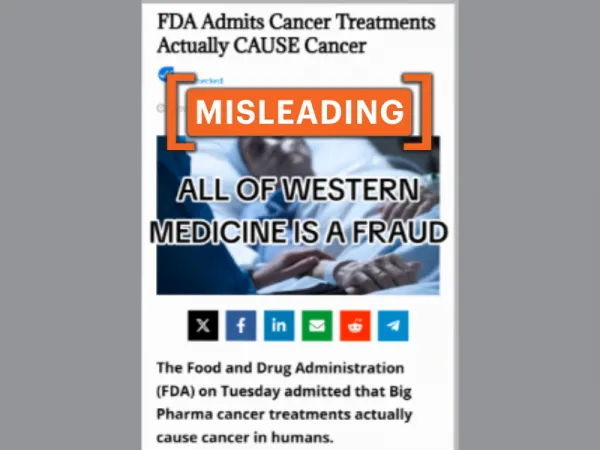By: Annet Preethi Furtado
December 18 2023
 Screenshots of viral posts claimins FDA admitted that cancer treatments cause cancer. (Source: TikTok/Screenshot/Modified by Logically Facts)
Screenshots of viral posts claimins FDA admitted that cancer treatments cause cancer. (Source: TikTok/Screenshot/Modified by Logically Facts)
The FDA is only investigating the risks involved with CAR T therapy. It has not acknowledged or admitted that all cancer treatments cause cancer.
What's the claim?
An article by The People's Voice is circulating online with the claim that the U.S. Food and Drug Administration (FDA) has admitted that cancer treatments cause cancer. Screenshots from the article have been put together in slideshow format, and the video is being widely shared on TikTok with hashtags such as #fda, #cancer, #cancertreatment, #medicine, and #fraud. One video, overlaid with the text, "ALL OF WESTERN MEDICINE IS A FRAUD," had garnered over 19,000 likes at the time of writing.
Another such TikTok video was overlaid with the text: "WE THE PEOPLE WANT ALLLLL DOCTORS AND NURSES IN THAT FIELD ARRESTED IMMEDIATELY !!!! SHARE THIS IF U FEEL OUR GOVERNMENT SHOULD ISSUE A WARRANT IMMEDIATELY IIII FOR CRIMES AGAINST HUMANITY !!!! (sic)" Archived versions of these posts can be found here and here.
The People's Voice article is also being shared on X and Facebook. Archived versions of such posts can be viewed here and here. The article is headlined "FDA Admits Cancer Treatments Actually CAUSE Cancer" and was published on November 30, 2023. Attributed to Sean Adl-Tabatabai, it carries a strap claiming that the FDA allegedly admitted that cancer treatments from pharmaceutical companies can cause cancer in humans.
Screenshots from the viral TikTok videos. (Source: TikTok/Modified by Logically Facts)
The People's Voice, formerly known as Newspunch and Your News Wire, is well known for peddling misleading information and articles related to pseudoscience, and the claims made in its article are misleading. The FDA had announced an inquiry into CAR T treatment rather than all cancer therapies.
The People's Voice article
We reviewed the article in question and noted that while its headline and strap make a generic claim about all cancer treatments, the rest of the article is about CAR T therapy. This is, however, not reflected in the video going viral, giving a misleading picture of the situation. This misinformation is exacerbated by captions in some posts, asserting that "All Western medicine is fraud," a statement that goes well beyond the FDA's comments on a specific cancer treatment.
This is usually how The People's Voice peddles misinformation in several of its articles. Logically Facts has previously debunked several narratives pushed by this website.
What did the FDA say?
The FDA has not 'admitted' that 'Big Pharma cancer treatments' cause cancer, as claimed in the article. Rather, on November 28, the FDA had issued a statement announcing instances of T-cell malignancies, a group of blood disorders, in patients who underwent chimeric antigen receptor T-cell (CAR T) therapy, a form of cancer immunotherapy targeting B-cell maturation antigen (BCMA) or cluster of differentiation 19 (CD19).
Currently, the health agency has approved six CAR T cell treatments—Abecma, Breyanzi, Carvykti, Kymriah, Tecartus, and Yescarta—in this category. The FDA concluded that the risk of T-cell malignancies is relevant to all genetically modified autologous CAR T cell immunotherapies directed at BCMA-directed and CD19. It adds patients undergoing treatment with products within this class have experienced T-cell malignancies. The agency acknowledged an ongoing investigation into the identified risks.
In response to social media claims alleging that the "FDA admitted all cancer treatments cause cancer," the agency told Logically Facts, "We also note that the safety communication is specific to those products (CAR T cell immunotherapies) included in the web posting and does not address nor should be construed as commenting on other cancer treatments."
What is CAR T-cell therapy?
CAR T-cell immunotherapy is a type of cancer treatment that was first approved in November 2017. The American Cancer Society explains that CAR T cell therapy involves modifying T-cells, a type of white blood cell, in a lab to empower them to locate and eliminate cancer cells. It adds that this therapy is often referred to as a form of cell-based gene therapy, as it alters the genes within T-cells to enhance their ability to combat cancer.
What prompted FDA's investigation?
The investigation, prompted by reports of T-cell malignancy, has stemmed from data gathered in clinical trials and postmarketing adverse event surveillance, as disclosed in the November 28 press release.
In a separate statement to Logically Facts, the FDA informed us that it had received 20 reports of T-cell malignancy, comprising 15 FDA Adverse Event Reporting System (FAERS) reports and 5 cases from clinical trials. The FDA added, "The initial approvals of these products included postmarketing requirements (PMRs) under Section 505(o) of the Federal Food, Drug, and Cosmetic Act (FDCA) to conduct 15-year long term follow-up observational safety studies to assess the long-term safety and the risk of secondary malignancies occurring after treatment. While the risk of secondary malignancies is already labeled, the FDA's safety communication describes reports specifically of T-cell malignancy."
The FDA also informed that, although the current benefits of the therapy outweigh potential risks, it is actively assessing the identified risk of T-cell malignancy with serious outcomes.
The verdict
The U.S. Food and Drug Administration is currently investigating chimeric antigen receptor T-cell (CAR-T) cancer therapies due to concerns surrounding potential cancer risks in treated patients. Although the article by The People's Voice article discusses CAR T therapy, its headline does not accurately convey this information. Notably, social media posts, without reference to CAR T, have disseminated unsubstantiated claims. Therefore, we categorize the claim as misleading.